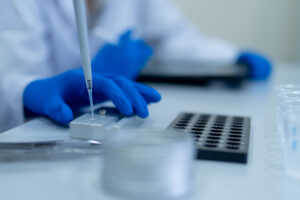What is Trisomy 13?
Trisomy 13, also known as Patau syndrome, is a rare genetic condition caused by the presence of an extra chromosome 13. Normally, individuals have two copies of each chromosome, but in Trisomy 13, there are three copies of chromosome 13, which disrupts normal development and leads to severe medical challenges. There are three types of this rare disease, each caused by variations in the third copy of chromosome 13.
Genetic testing is essential for diagnosing Trisomy 13 and determining its specific type. Tests such as karyotyping or chromosomal microarray analysis can identify the presence of the extra chromosome and its variations. Early genetic diagnosis is crucial for understanding the condition, providing appropriate medical care, and offering families vital information about the prognosis and potential management strategies.
The syndrome is not usually inherited and is usually the result of spontaneous chromosomal changes. Sometimes, it may be caused by an inherited chromosomal event known as translocation.
The main symptoms of the syndrome include heart defects, spinal abnormalities, and severe intellectual disability.
It may be considered one of the more common chromosomal abnormalities,
Genetic diagnosis for Trisomy 13
Symptoms of the syndrome are usually identified as severe and identified before or just after birth.
Most babies born with Trisomy 13, do not survive their first year of life.
- Heart defects
- Spinal cord abnormalities
- Brain anomalies
- Cleft lip, and/or cleft palate
- Vision issues
- Hearing problems
- Seizures
- Low muscle tone
- Extra fingers and/or toes
- Severe intellectual disability
Genetic testing
Genetic testing for Trisomy 13 will usually involve some form of screening during pregnancy. Non-invasive genetic prenatal testing and ultrasounds are less risky options to test for the syndrome. Amniocentesis or chorionic villus sampling, is able to diagnose Trisomy 13 with a 99% accuracy rate.
Genetic testing for Trisomy 13 will identify the specific form of the syndrome and its cause.
There are three types of the syndrome:
- Full Trisomy 13: When the third copy of chromosome 13 is present in all of the cells. This type accounts for 95% of all cases of Trisomy 13.
- Mosaic Trisomy 13: When the third copy of chromosome 13 is only present in some of the body’s cells. This type makes up around 5% of all cases.
- Partial Trisomy 13: when just a part of the third copy of chromosome 13 is found in the cells. This type is the rarest, accounting for less than 1% of all cases.
Generally, older mothers are considered to be at higher risk for chromosomal abnormalities in their children, and this would make older maternal age a risk factor for Trisomy 13 as well.
Genetic counseling
Genetic counseling is an integral part of the genetic diagnosis process for all rare diseases, and Trisomy 13 is no exception. Genetic counseling is especially important when it comes to Trisomy 13, due to the severe symptoms of the syndrome. Most infants born with Trisomy rarely make it past their first birthday, and so both they and their families have complex physical and emotional needs, that require expert, and consistent, genetic counseling.
Genetic counseling will:
- Emotionally support rare disease patients and their families through the genetic testing process. This is especially important when it comes to Trisomy 13. This will include information and awareness about the different causes of the syndrome.
- Help parents understand the different options for testing, what each type of testing involves, and how to make sense of the results.
- Explain the symptoms of the syndrome, including recommendations for early intervention and treatment, and understand them to ensure a more accurate diagnosis.
- Help coordinate the medical staff and professionals involved in the care of someone with Trisomy 13.
A genetic diagnosis of Trisomy 13 syndrome will be difficult to process for many families. Access to expert genetic counseling is imperative for anyone facing a diagnosis of Trisomy 13 in their baby. Genetic diagnosis of Trisomy 13, is a life-changing event, and genetic counseling prepares families for what it will mean, both for their child and for themselves.



